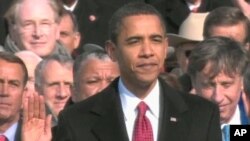His presidency began before a crowd a million strong, but when the cheering stopped, he was one man dealing with overlapping crises: an economy in free fall and two unpopular wars.
"The typical president, I think, has two or three big problems; we've got seven or eight big problems," Mr. Obama said.
And as he took on those challenges, a presidential style emerged. He became known as no-drama Obama...even, and reserved. His fellow Hawaiians see a pattern.
"His cool, calm and collectiveness is very Hawaiian," noted Ku'ulei Stockman a Hawaiian educator.
She says the first Hawaiian-born president has brought the island culture and mind-set to the White House.
"We see it every day in him," she added. "We see it in his speeches. He just lives, eats and breathes the culture of aloha."
Aloha literally means "breath of life." The aloha culture is a sense of community, a belief that everyone should get along.
"There is a certain amount of that islander style there," said Ken Walsh of the magazine USNews and World Report. "He feels that he is not a kind of guy who is confrontational. He tries to be very methodical and be very inclusive and that comes directly from the Hawaii experience."
Walsh says you can see the Hawaiian influence throughout Barack Obama's life, starting with his stint as a community organizer in Chicago.
"He was a guy who tried to get people to work on their own behalf, to get things done and to try to have everybody contribute," he added.
That same sense of inclusiveness became even more apparent during his years as a law student and professor. It was there that Barack Obama honed his decision-making skills, and his approach to problem solving.
Dan Johnson-Weinberger was one of his students at the University of Chicago Law School.
"He really actively encouraged a discussion," he noted. "There was a feeling that if you weren't participating in the discussion, you weren't living up to expectations for the classroom - which really wasn't how other classrooms worked. There it is all about the professor."
Johnson-Weinberger says Barack Obama urged his students to look at all sides of a case, and glean all the information they could.
"I would imagine that if he runs his cabinet meetings or his meetings with his advisors in the same way he ran his classroom, no one gets to coast and keep their mouth shut and agree at the end," he added. "I would imagine their job is to make a case forcefully. Respectfully, but forcefully."
Mr. Obama's top advisors indicate that is the way things work in the White House. Barack Obama in his decision-making is like a lawyer dissecting a case. And in his public comments, he is very much the educator-in-chief.
Martha Joynt Kumar, who teaches political science at Towson University, hears a fellow professor in his voice.
"Oh yes, because he likes dealing with the larger issues and tying things together and, yes, you definitely see that in him," she noted. "And I think you see it also in his explanations of things. He likes to be in situations where he can talk at length about what the parts are of an issue."
Every president is the sum of his past experiences. In Barack Obama's case, they have resulted in a unique presidential style that critics claim is too detached, and lacking passion.
But Ken Walsh predicts that Barack Obama, who promised to change America, will stay true to himself.
"He is going to stay with the traits that have gotten him so far in his political career," said Walsh.
The big question as he enters his second year in office is will the traits that brought him to the presidency deliver the results he needs.
Obama Develops Distinctive, Presidential Style

In his first year in office, Barack Obama has developed a unique presidential style, an approach to governing shaped by the experiences of his lifetime.



